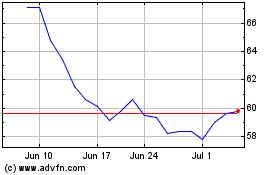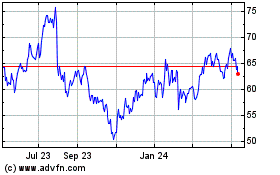By Nina Trentmann and Kristin Broughton
This article is being republished as part of our daily
reproduction of WSJ.com articles that also appeared in the U.S.
print edition of The Wall Street Journal (August 7, 2020).
Companies have been stockpiling cash to navigate the coronavirus
pandemic, and some are getting eager to spend it.
Cash holdings of U.S. public companies amounted to $2.54
trillion during the latest reported quarter, up from $1.96 trillion
at the end of 2019 and $1.86 trillion from the second quarter in
2019, according to S&P Global Market Intelligence.
While it can be reassuring for finance chiefs to have ample cash
and liquidity amid the economic downturn, many executives feel they
need to put their companies' capital to work, using it to seize
growth opportunities and generate returns for shareholders.
"We absolutely want to go and deploy capital," said Greg Lewis,
chief financial officer of Honeywell International Inc. "This is
truly an opportunity for us to go do that." The industrial
conglomerate -- with more than $15 billion in cash holdings and
short-term investments as of June 30, according to S&P -- plans
to use its liquidity to scoop up other companies.
The coronavirus pandemic has created a divide between corporate
haves and have-nots, with some companies building on existing
stockpiles of cash and enjoying access to cheap debt, while others
are struggling to survive. The tally of chapter 11 filings in the
first seven months of the year rose 30%, according to data by
legal-services firm Epiq Systems Inc.
Microsoft Corp., with $136.5 billion, topped the list of
America's cash-rich companies as of June 30, according to S&P.
The software company could find use for some of that as it is in
advanced talks to purchase the U.S. operations of video app TikTok.
Other companies with significant cash and short-term investments
include Google parent Alphabet Inc., with $121.1 billion, and car
maker Ford Motor Co., with nearly $40 billion in the
latest-reported quarter, S&P data show.
Most companies have held back from spending on share-buyback
programs and dividends since the beginning of the pandemic. Some
businesses with strong cash holdings, such as cereal maker Kellogg
Co., said they plan to focus on investing in their brands, capital
expenditures and repaying debt.
Other executives are starting to look at deal making again
despite an uncertain economic outlook and the coming presidential
election, said David Hunt, a senior director for mergers and
acquisitions at Willis Towers Watson PLC, an advisory and brokerage
firm.
Beyond the potential Microsoft-TikTok deal, some recent
transactions include Google's deal to buy a 6.6% stake in
security-monitoring provider ADT Inc. for $450 million. Marathon
Petroleum Corp. on Sunday said it plans to sell its gas stations to
7-Eleven Inc. for $21 billion.
Atkore International Group Inc., an electrical infrastructure
company based in Harvey, Ill., had put its acquisition strategy on
hold earlier this year when the pandemic unfolded. A recent rebound
in the company's stock price and an increase in cash reserves
prompted Atkore to revisit potential deals, said David Johnson, the
company's CFO. Mr. Johnson said the company is looking for deals to
expand in areas such as specialty metal conduits and security
products.
"Barring a major global lockdown being imposed, we can expect a
continued acceleration of deal making with cash being an element of
it," said Andrea Guerzoni, global vice chair for strategy and
transactions at Ernst & Young. "Big and financially robust
companies are ready and able to fund significant deals if they want
to."
Even though transaction volumes are significantly down compared
with the prior-year period, mergers-and-acquisitions activity has
picked up in June and July, according to EY.
PayPal Holdings Inc., the payments company, said it is sticking
to its annual target of spending $1 billion to $3 billion on
acquisitions even during the pandemic. "We've always been balanced
between M&A, organic investment and returning cash to
shareholders, and we've also been opportunistic," Chief Financial
Officer John Rainey said on a second-quarter earnings call in July.
The company had about $13 billion in cash and short-term
investments at the end of June, according to S&P. Its latest
transaction was the $4 billion purchase of shopping and rewards
platform Honey Science, which closed in January.
Average cash holdings in the tech sector increased roughly
twofold over the decade through 2019 to $9.95 billion, according to
Bain & Co., a management consulting firm. By contrast, average
cash holdings for the total S&P 500 increased 35% to $3.65
billion over the same period.
Still, tech companies aren't making aggressive plays yet in this
recession like they did during the credit crisis. "Executive focus
is on Covid-19 and managing through Covid-19," said Adam Haller, a
partner at Bain. "So finding the executive bandwidth and mind share
to focus on acquisitions is a big part of why you're not seeing
M&A happen in tech right now."
Also, tech companies are under more regulatory scrutiny, said
Daniel Ives, an analyst at financial-services firm Wedbush
Securities Inc. Companies in other sectors could move into
acquisition mode in the coming quarters amid rising cash balances,
he said.
FleetCor Technologies Inc., an Atlanta-based payment-solutions
company, is searching for potential acquisition targets following
four deals in 2019, said Steve Greene, executive vice president for
corporate development and strategy. "As the economic picture
becomes a little more certain, we are again starting to look at big
deals," Mr. Greene said, adding the company would spend about $3
billion or more on such a transaction and likely would use a
combination of cash and debt to fund a deal. FleetCor had about
$1.1 billion in cash on its balance sheet as of March 31, the
latest available figure.
As part of its due diligence, FleetCor is scrutinizing the
ability of potential acquisitions to recover from the pandemic, Mr.
Greene said. "We want to see the trajectory and whether companies
will make it back to their pre-Covid levels," he said.
Mark Maurer contributed to this article.
Write to Nina Trentmann at nina.trentmann@wsj.com and Kristin
Broughton at kristin.broughton@wsj.com
(END) Dow Jones Newswires
August 07, 2020 02:47 ET (06:47 GMT)
Copyright (c) 2020 Dow Jones & Company, Inc.
PayPal (NASDAQ:PYPL)
Historical Stock Chart
From Mar 2024 to Apr 2024

PayPal (NASDAQ:PYPL)
Historical Stock Chart
From Apr 2023 to Apr 2024
